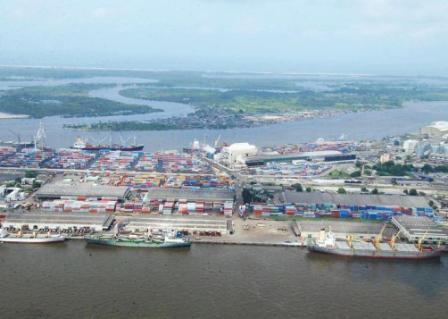Terminal Handling Charges (THCs), the main source of revenue for terminal operators in Nigeria, has dropped by 22.4 per cent over the last 10 years.
Deloitte, a global accounting and audit firm, said this in a report made available to the News Agency of Nigeria (NAN) on Monday in Lagos.
It said the decline in the revenue between 2006 and 2016 was caused by depreciation of the naira and inflation.
The report was released by Mr Bola Asiru, Deloitte Director of Strategy and Operations in Nigeria, and Mr Oladotun Bamigbetan, a Senior Manager.
NAN reports that the THCs are payments received from transferring cargo from ship and quay side to the yard for release to clearing agents and customers.
NAN reports that 26 terminals in Nigerian ports were concession in 2006 to private terminal operators.
The audit firm’s report is titled: “Public Private Partnership (PPP) as an Anchor for Diversifying the Nigerian economy: Lagos Container Terminals Concession as a Case Study’’.
The report said foreign exchange fluctuation impacted the value of the THCs with over 224 per cent depreciation between 2006 and 2016.
“In real economic terms, the terminal operators are losing revenue by not adjusting their THCs in line with market realities,’’ Deloitte said.
The firm said the foreign exchange challenges which Nigeria faced as a result of the fall in global oil prices was further pronounced for terminal operators as a large part of their capital expenditure and operational costs were in U.S. dollars.
It said that the operators’ dollar-denominated costs included equipment acquisition, maintenance costs and payment of lease fees to the Nigerian Ports Authority (NPA).
According to the report, 83 per cent of terminal operators’ revenue is received in naira, while 17 per cent is received in U.S. dollars.
“Terminal operators have to constantly source for U.S. dollars through the parallel market at very high rates in order to meet their statutory and operational cost obligations,’’ Deloitte said.
The report said that terminal operators faced huge challenges in the area of storage as the terminals were used as “cheap storage warehouse alternatives by cargo owners’’.
“The current policy provides for a free three-day storage, after which a charge of N900 is applied per day and regulated by the NPA.
“Importers take advantage of the low storage charges offered by the terminal operators to store their imported goods at the terminal as opposed to offsite warehousing facilities that charge as much as N60,000 per day.
“This leads to congestion at the terminals and hinders the productivity and storage capacity of the terminal,’’ the report said.
It said that during the 10-year period under review (2006 to 2016), terminal operators made huge investments on acquisition of modern cargo handling equipment.
The report said terminal operators also invested on development of port infrastructure such as buildings, quays and storage yard; lighting; automated tracking system; trainings and supply of electricity.
It said: “As a direct impact of these investments, the ports have witnessed increased ship traffic and throughput which has led to a 400 per cent rise in container throughput from 400,000 TEUs in 2006 to 1.6 million TEUs in 2014.’’
“The investments have also led to the eradication of ship waiting time at the container terminals as ships now berth on arrival.
“Vessel turnaround time has been reduced from five days to 41 hours, while average dwell time for cargo clearance went down from over 30 days to just 14 days.
“In addition, due to improved security and lighting of the terminals, the ports now run 24-hours (daily) and 7-days-a-week operations,’’ the report said.
According to the report, there are also some major investments made by the NPA on behalf of the government to increase traffic at the ports.
“Most laudable is the dredging of the channels from nine metres to 13.5 metres.
“The NPA also invested in the provision of larger tug boats to service shipping companies.
“This has led to larger ships calling particularly at the Lagos Port Complex and Tin-Can Port, thereby increasing the throughput.
“The NPA has been a positive partner in the concession process but there still exists opportunities to further optimise the existing Lagos port infrastructure to meet medium term needs of the sector,’’ the report said. (NAN)
AIC/AJA/TA

